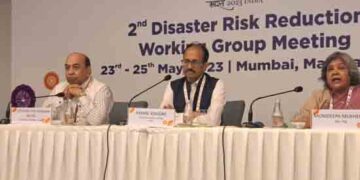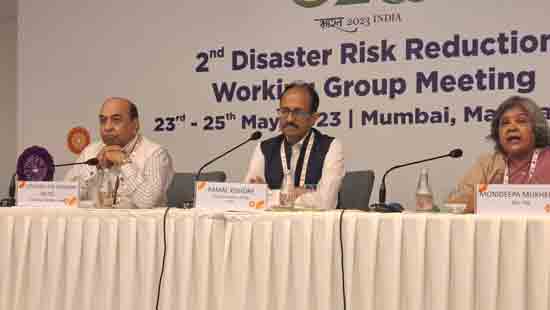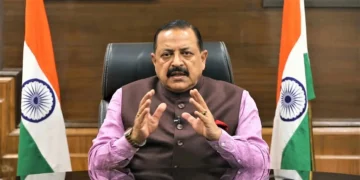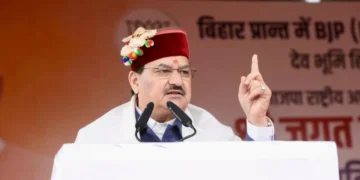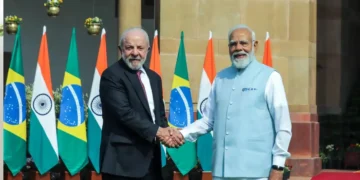 A three day 2nd Disaster Risk Reduction Working Group meeting of G20 countries during May 23 and 25 in Mumbai will hold extensive deliberations on Global coverage of Early Warning Systems for all hydro-meteorological disasters, Increased commitment towards making infrastructure systems disaster and climate resilient, Stronger national financial frameworks for disaster risk reduction, Strengthened national and global disaster response system to address the consequences of increasing frequency and intensity of disasters and Increased application of ecosystems-based approaches to disaster risk. The National Disaster Management Authority (NDMA) member secretary Kamal Kishore, who was accompanied by member Let Gen Syed ATA Hasnain (retired), on Monday told reporters that India and other countries can share their experiences and cooperate in further strengthening the disaster risk reduction which will cover the entire spectrum including disaster preparedness, disaster response, disaster resilience and recovery.
A three day 2nd Disaster Risk Reduction Working Group meeting of G20 countries during May 23 and 25 in Mumbai will hold extensive deliberations on Global coverage of Early Warning Systems for all hydro-meteorological disasters, Increased commitment towards making infrastructure systems disaster and climate resilient, Stronger national financial frameworks for disaster risk reduction, Strengthened national and global disaster response system to address the consequences of increasing frequency and intensity of disasters and Increased application of ecosystems-based approaches to disaster risk. The National Disaster Management Authority (NDMA) member secretary Kamal Kishore, who was accompanied by member Let Gen Syed ATA Hasnain (retired), on Monday told reporters that India and other countries can share their experiences and cooperate in further strengthening the disaster risk reduction which will cover the entire spectrum including disaster preparedness, disaster response, disaster resilience and recovery.
- Disaster Risk Financing to take centre stage at Second G-20 DRRWG Meeting from May 23-25, 2023
- 2nd DRRWG Meeting in Mumbai follows the Mid-Term Review (MTR) of the Sendai Framework for Disaster Risk Reduction 2015-2030
Kishore said that India has already evolved the mechanism for financing disaster management. He added that the 15th Finance Commission has already earmarked $29 billion over five years (2021-2025) for states to cut disaster risk and for disaster management, response, reconstruction and recovery. This apart, the working group will hold discussions with private sector players on financing risk prevention (financing disaster risk reduction). ‘The working group will discuss the possibilities of horizontal collaboration with the private sector,’’ he noted. He however, declined to divulge details with regard to the participation of private sector companies at Tuesday’s discussion.
This meeting has been strategically planned to immediately follow the Mid-Term Review (MTR) of the Sendai Framework for Disaster Risk Reduction 2015-2030, organized by the President of the General Assembly at the United Nations Headquarters in New York from May 18th to 19th, 2023. Within this context, the G-20 platform stands resolute in its commitment to delivering all-encompassing solutions in alignment with the objectives of the Sendai Framework.
The three day working group meeting takes place at a time when G20 countries have a high level of exposure to disaster risk, with a combined estimated Annual Average Loss of $218 billion or 9% of their average annual investment in infrastructure. G20 Leaders’ declarations have from time to time acknowledged the importance of disaster risk reduction and resilience. However, the issue has not been addressed by the G20 in a comprehensive and sustained manner. A new working group on Disaster Risk Reduction has therefore been established under India’s Presidency to encourage collective work by the G20, undertake multi-disciplinary research and exchange best practices on disaster risk reduction.
India on assuming the Presidency of the G20 from Indonesia established the first G20 working group on Disaster Risk Reduction, to encourage collective work by the G20, undertake multi-disciplinary research and exchange best practices on disaster risk reduction.
‘’Growing disasters around the world, the majority of which are currently driven by climate change, but also bearing in mind the destructive power of deadly geophysical hazards, threaten the lives of millions and are taking an increasing toll on economic development,’’ said NDMA.
Kishore said that the discussions will cover the entire spectrum of all hazards including cyclones, landslide with a focus on knowledge and experience management. He added that India has invested in building disaster preparedness and management. ‘’Two zone states have already established the State Disaster Response Fund (SDRF). Kishore noted that India sent its teams to Syria and Turkey during earthquakes to contribute towards disaster relief.
Moreover, the DRRWG will host side events highlighting the significance of infrastructure risk assessment tools and data platforms, as well as the importance of adopting a ‘build back better’ approach that integrates ecosystem-based strategies and engages local communities. Additionally, the meeting will address various other agendas, such as establishing a national framework, incentivizing private investments, and supporting disaster preparedness, which will contribute to building a more resilient future.
The second DRRWG meeting will have a substantial attendance from G20 member countries, invited nations, international organizations, and important Indian key stakeholders, including the National Disaster Management Authority, Ministry of External Affairs, National Institute of Disaster Management, and National Disaster Response Force.
